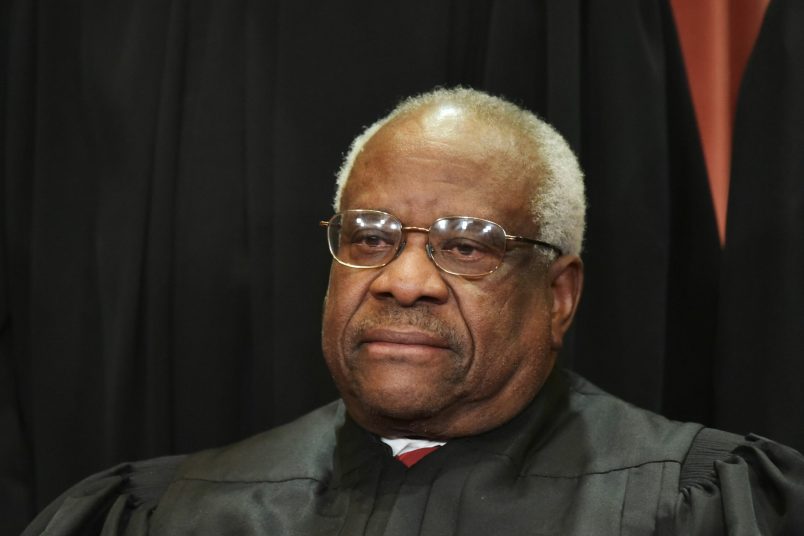Justice Clarence Thomas penned a 20-page rant equating the abortion rights movement to eugenics, which accompanied the Supreme Court’s move on Monday to essentially punt on the issue in a closely-watched case from Indiana.
In his concurrence, Thomas said the court would have to at some point “confront” the type of abortion ban passed by Indiana in 2016 that was struck down by an appellate court last year. The Indiana law banned abortions in cases where the doctor knows that woman’s sole reason for seeking the procedure was due to the fetus’ race, sex or a disability.
The Supreme Court on Monday issued a per curium order (meaning it was not signed by the individual justices) letting the appellate decision stand. The order said that it expressed “no view on the merits” of Indiana’s ban, while noting that no other appellate court has weighed the question yet. The court, additionally, used a narrow legal argument to justify upholding another aspect of the Indiana law that required abortion providers to cremate or bury fetal remains.
Thomas took the extra step of writing a concurrence to explain his view that bans like the Indiana law “promote a State’s compelling interest in preventing abortion from becoming a tool of modern-day eugenics.”
“The use of abortion to achieve eugenic goals is not merely hypothetical,” Thomas said. His concurrence went through many of the favorite talking points of the anti-abortion movement in this regard, pointing to the abortion rights advocates of the 20th century who “endorsed the use of abortion for eugenic reasons.”
Notably, Thomas at times also implied that he viewed birth control as similarly tied to eugenics.
“This case highlights the fact that abortion is an act rife with the potential for eugenic manipulation,” he wrote. “From the beginning, birth control and abortion were promoted as means of effectuating eugenics. Planned Parenthood founder Margaret Sanger was particularly open about the fact that birth control could be used for eugenic purposes.”
Thomas then claimed that “a growing body of evidence suggests that eugenic goals are already being realized through abortion.”
He pointed specifically to the relatively higher abortion rates among African American communities.
“Whatever the reasons for these disparities, they suggest that, insofar as abortion is viewed as a method of ‘family planning,’ black people do indeed ‘tak[e] the brunt of the “planning,”‘” he wrote.
While it’s not exactly a surprise that Thomas, perhaps the court’s most conservative justice, would take a hard line on abortion, he’s amped up his rhetoric just as many red states have been pusing their own extreme bans on the procedure. Other states have passed reason-based bans similar to Indiana’s. But legislatures in Missouri, Alabama and Georgia have gone even farther in recently passed bills prohibiting abortion at very early stages in women’s pregnancy.
The new push appears to be tied to the departure from the Supreme Court of Justice Anthony Kennedy, who sometimes sided with liberals in abortion cases.
Thomas’ concurrence, for all of its anti-abortion fire, acknowledged that he agreed with the court’s decision to not, for now, take up a case on an Indiana-style ban, so that “further percolation may assist our review of this issue.”
However, he end the concurrence noting that, although “the Court declines to wade into these issues today, we cannot avoid them forever.”
“Having created the constitutional right to an abortion, this Court is duty bound to address its scope,” Thomas said, before referencing the court’s 1992 Planned Parenthood v. Casey decision that upheld a right to an abortion.
“In that regard, it is easy to understand why the District Court and the Seventh Circuit looked to Casey to resolve a question it did not address. Where else could they turn? The Constitution itself is silent on abortion,” Thomas wrote.






